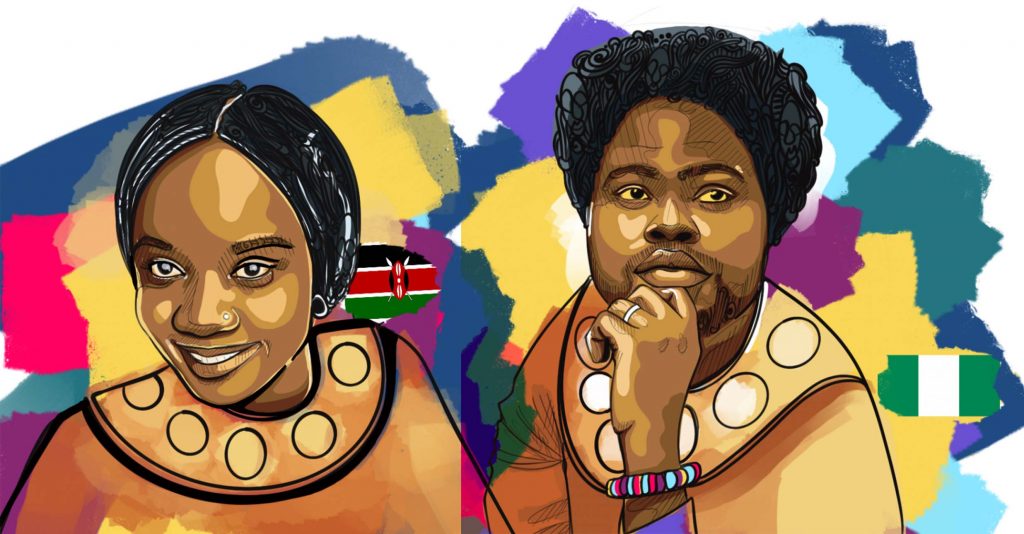Unplug Africa
When we take a pause, unplug ourselves for a bit, rethink our choices, we may take control of our digital destinies.
2050 Conference
Naserian took a hydrogen-powered bullet train from Ghana to Berlin, Germany in three hours where she had gone to mentor some African youth building Ubunifu, a disruptive Robotic Liaison Company in her role as the African Union Ethical Technology Advisor; after which she connected to Lilongwe in Malawi to honour the invitation of the African Union to speak on Artificial Intelligence Ethics to the African Parliamentarians at the Unplug Digi-Africa Conference. As the train took off in Berlin, she began to reminisce on some of the technophobic situations she had read about and what could have fuelled those behaviours. She thought there could be some lessons to learn from past situations if we must understand where we are presently in human history.
Her first reflection was on the “Inunibini”, a group in Western Atusia that destroyed all the humanoid robots in the country through rebellious, violent actions. They were a group of people who believed that their livelihood had been taken away by humanoid robots’ engagement in hotels, corporate offices, and even industrial systems. Robots had taken over all the human functions with little human communication. In their Manifesto, the “Inunibini’s” alluded to operating on the principles of “Luddism”, the philosophy that speaks to technophobia and machine destruction. The group was punished by the government of Atusia, and many of the leaders of the movement were put on a life sentence. But the world never bothered to hear the justification for their actions. Could it be that they were fighting for what they believed is purpose and fulfilment in their labour and work of their hands? Could there have been a middle ground compromise between the government of Atusia and the “Inunibini” group?. These were the questions racing through Naserian’s mind. Her mind played staccato by switching to reminiscing on “Hekima”, the 1945 movie based on the adaptation of the works of Celestine Mugisha. In the film, Shabalala, a workers’ union leader, led a revolution against modern saw machines in the wood production companies.
“Hello, ma, are you fine”?. (robotic language type)
That was the voice of the humanoid train host by Shobaloju, who had come to serve Naserian some refreshments. She didn’t know she was so lost in thoughts that she was already shivering and sweating due to the profound insights of caution she got from her two significant reflections. She arrived in Lilongwe, Malawi and the African Union Autonomous Self Driven vehicle was at the train station to receive her by beeping a light signal of her name on the windshield. As she was driven through the beautiful street of Lilongwe, she could not but feel energised that she will be sharing with parliamentarians from all across Africa on the topic “Humane Digital Society” the next day and the subject “Unplugged” the day after. “There is no better time to be an African than now”, Naserian thought to herself as she alighted from the car and retired to her room for the night.
“Distinguished African Leaders and lawmakers, you may be wondering why we are meeting face to face when this could have been a virtual meeting?. The C0VID-19 pandemic in 2020 was detrimental to humanity but provided Africa with an opportunity to innovate and leapfrog in addressing our digital divide. In 2026, Somalia’s Digi-peace approach on mediating between Al Shabaab using AI technology became a model on how African Knowledge could bring lasting peace. We witnessed the making of the water-app technology at the University of Lilongwe that mapped polluted water bodies and treated them, reversing climate change effects by improving clean water access. In 2029, the Eco-Clima pandemic wrecked the continent and was linked to e-waste, which gave us an impetus to rethink how to protect our ecosystem. The virtual citizen action groups have been calling for reforms on the right to repair and upgrade digital devices, including new research on reclaiming landfills and building a healthy, waste-free ecosystem. I am proud to inform you that we have a zero-waste reality today, something we never imagined would be possible in 2020.
So, why are we here if we have made such progress?. We have come to deliberate on our future as a people, even amid technology overload and digital obesity. This is undoubtedly the future we dreamt about three decades ago, but the more we evolved into new technologies, the more we have become less human while losing control of what matters as humans. We have been so clogged up amid devices and trails of computer codes that we have forgotten how to have great conversations offline. Our dinner tables are no longer fun because we now hold a spoon in one hand and our smartphone in the other. Our divorce rate has gone geometrically high because intelligent devices have taken the place of deep conversations in marriage, and our courts are filled with marital accusations cases emanating from digital footprints. The question that begs for an answer is, “are we progressing or regressing as a people?.
The room was dead silent after Naserian raised the points above. As she prepared to round off her speech to the African Parliamentarians, she charged them all to go back home and make policies that will balance our excitement of new technology as well as humanity. She reminded them of three things as they go back home to their various countries;
1. To make policies that encourage “sincere technologies”.
2. To create policies that establish the “centre of humane technology research” across the continent.
3. To make policies that include addressing technostress, digital obesity, and digital psychological dissonance.
“Dear African good people, let us take a pause, unplug ourselves for a bit, rethink our choices as we take control of our digital destinies. Long Live Africa”.
That was Naserian’s closing remark as she stepped down from the podium.
Download story as PDF